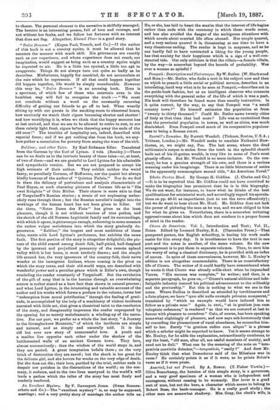Daidine ; and other Tales. By Karl Erdmann Edler. Translated
from the German by the Earl of Lytton. 2 vols. (Bentley.)—There can be no doubt an to the intrinsic beauty of these tales—or, at least, of two of them—and we are grateful to Lord Lytton for his admirable and sympathetic version. But we are not prepared to accept his high estimate of their author. They exhibit neither the weird fancy, so peculiarly German, of Hoff mans, nor the quaint but always kindly humour of the author of "Quintus Fixlein." Nor do we find in them the delicacy of portraiture and analysis characteristic of Paul Heyee, or such charming pictures of German life as in "Die zwei Krfiglein " of Otto Muller. Their charm is more akin to that of Turgefineff's Russian stories ; a strain of not unpleasing melan- choly rune through them ; but the Russian novelist's insight into the workings of the human heart has not been given to Edler. Of the three, "Notre Dame des Flute" has given us the least pleasure, though it is not without touches of true pathos, and the sketch of the old Norman Legitimist family and its surroundings, with which it opens, is picturesque enough, redeeming in some measure the rather vulgar melodrama into which the story gradually de- generates. " Baldine," the longest and most ambitions of these tales, meets with Lord Lytton's preference, but exhibits the same fault. The first portion of the story is altogether delightful; the pic- ture of the child reared among dumb folk, half .pitied, half-despised by the ignorant and prejudiced peasantry of the remote upland valley which is her home, is most tenderly drawn ; and the simple life around her, the very ignorance of the country-folk, their naive wonder at the immigrant Italians, whose coming is the pivot on which the story turns, and their old-world ways, are described with wonderful power and a peculiar grace whirl is Edler's own, though reminding the reader constantly of Turgueneff. But the revelation of the gift of mug that is in the heroine through an overwhelming sorrow is rather stated as a bare fact than shown in natural process ; and what Lord Lytton, in the interesting and valuable account of the author and his works which forms a preface to the volume, terms her "redemption from moral petrifaction" through the feeling of grati- tude, is accomplished by the help of a machinery of violent incidents narrated with little art, that gives a theatrical taint to the conclusion of the story, and disagreeably impresses the reader unprepared by the opening for no merely melodramatic a winding-up of the narra- tive. For our part, we prefer as a whole the last story, "A Journey to the Grossglockner Mountain," of which the incidents are simple and natural, and 88 simply and naturally told. It is the old but ever new story of unsuccessful love. A youth and a maiden live opposite each other under the shadow of the battlemented walls of an ancient German town. They love, almost unconsciously ; then the wisdom of the world steps in, and they are parted. A great temptation befalls them ; on the very brink of destruction they are caved; but the shock is too great for the delicate girl, and she hovers for weeks on the very edge of death. But she does not die ; their love, purified by the trial, neither ends in despair nor perishes in the distractions of the world ; on the con- trary, it endures, and to the two lives martyred to the world's will lends a pathos which the teller of the story has most finely and tenderly rendered.


































 Previous page
Previous page